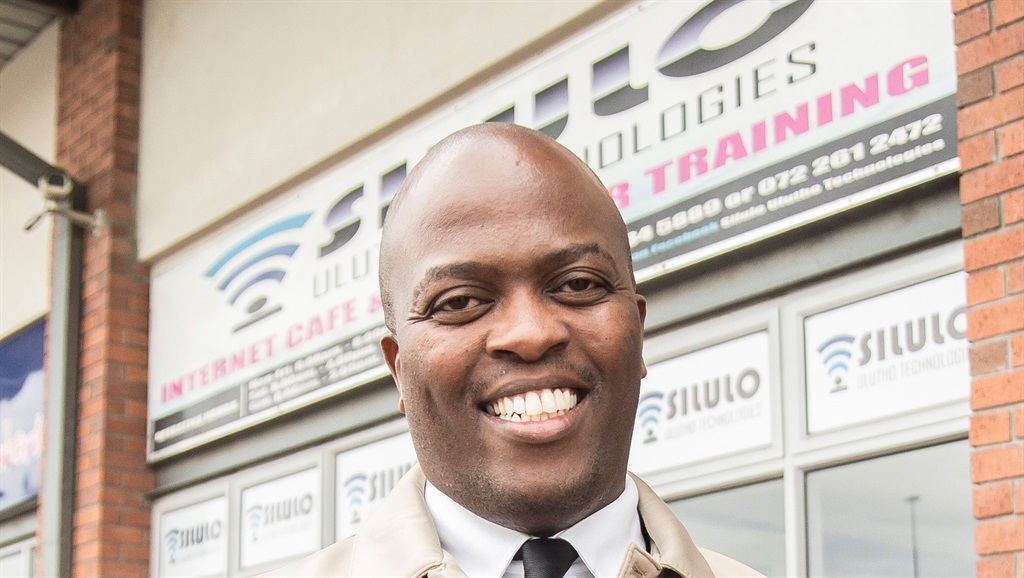
Township entrepreneur Luvuyo Rani has been robbed at gunpoint and had multiple banks turning down requests for funding. Today he is the chief executive of an award-winning social enterprise with a top-floor office in the city and a business that is helping thousands of South Africans to succeed. How did he get here? Through a mixture of hard work and staying true to first principles, he says.
Silulo Ulutho Technologies recently moved into new premises on the top floor of a prominent building in the heart of a Cape Town business district, offering impressive views and facilities. These new offices are a far cry from the township streets where the company began 14 years ago.
But while the company is moving ahead in leaps and bounds, chief executive Luvuyo Rani has not forgotten why he started his business in the first place.
“Things are changing fast; Silulo is becoming corporatised. But we don’t want to lose our spirit of entrepreneurship, our values, our connection to people. That is what makes us love what we do; the impact it has on the community. In the end that matters more than how much turnover we generate or where we expand to,” he says.
These ideas, and the story of Silulo’s success, are explored in detail in a recent teaching case study by the UCT Graduate School of Business, which made it onto the short list in the prestigious 2018 Ceeman Case Writing Competition in partnership with Emerald Group Publishing, and will shortly be used to teach business school students and other aspiring entrepreneurs about what it takes to be a successful social entrepreneur in South Africa.
Silulo Ulutho Technologies stands out because it is a social enterprise – driven primarily by the desire to empower township and rural communities by connecting them to the world of technology. The company’s name is based on the first syllables of the three founding partners: Sigqibo, Luvuyo and Lonwabo Rani. Silulo means “we are” in isiXhosa while Ulutho translates as “value”.
It all began in 2004 when Luvuyo Rani, a teacher in Khayelitsha, saw teachers struggling with the new computer technology that was being introduced into classrooms. His entrepreneurial instincts led him to partner with his brother, Lonwabo, and they started selling computers and parts from the boot of his Corsa Lite. Rani gave up his job, much to the surprise of peers, to focus on his new venture.
By the end of the first year, they had sold 15 computers. The following year, they found a new partner in Nandipha Matshoba and made the move from car boot to shop premises – developing a “one-stop shop” model, offering internet access, training, sales, help, repairs and mobile support.
By 2008, they had perfected this model and started to expand. Today Silulo has 46 stores in townships and rural areas in the Western, Eastern Cape and KwaZulu-Natal, 220 full-time staff members, and 21 franchises – and is making a difference in the lives of thousands of South Africans.
Several awards and accolades have accrued over the years, including the national productivity award and the Endeavour global entrepreneur award. Luvuyo Rani was featured in Forbes Magazine’s March issue in 2014 and he was the Schwab Foundation social entrepreneur of the year in 2016.
This year, Silulo’s revenue has levelled out at about R20 million, most of which went into operating expenses.
One of strengths of the business has been the entrepreneurial spirit that has kept it one step ahead. As the internet became more accessible and smartphones entered the market, for example, the company adapted its business model to offer more training courses and partner with other companies – Silulo has become a known brand and this has opened doors for the business. At the same time the business has been helping to secure loans for individuals to open franchises, mentoring young entrepreneurs and creating networks for others to succeed. In 2018, the Silulo Business Incubation Hub was opened in Mitchells Plain, to assist young entrepreneurs in setting up and launching their business.
Another strength has been the business’ ability to stick to its original purpose. Matshoba says, “The challenge is to stay true to what drove us in the beginning. If we partner with other companies, we look for those who can bring real value to our communities.”
The company has also created a foundation to make a bigger impact in the communities in which it has a presence.
One of its longstanding partners has been the Bertha Centre for Social Innovation and Entrepreneurship at the UCT Graduate School of Business, and the two have enjoyed a rich and deep learning engagement over the years, which led to the decision to write up Silulo’s story as a teaching case study.
The study’s principal author, Eckard Smuts, believes Silulo is a homegrown success story that can inform a new academic paradigm for African business schools.
“It can show us what innovation looks like and how it should look in an emerging market context, like South Africa.”
One thing is clear – this success does not come easily. For the past 14 years, Luvuyo Rani has worked night and day; living, eating and sleeping his business. There has been little time for anything else. It cost him one relationship and he and his brother have also been held at gunpoint and robbed by armed men in Khayelitsha. Over the years, some of their shops have been vandalised and stock taken, and they have had their struggles in obtaining loans and funds. But none of this has been able to hold them back.
“Too many people want to hit the big time, to be instant millionaires. We need to realise that what works in other places, places like California, isn’t going to work for us here. This isn’t about being a pop star or a politician. Our story that needs to be told – is a story of hard work. It’s not about celebrating flashy achievements or flattering egos.”
Luvuyo Rani hopes that through this teaching case study, young entrepreneurs will learn from the example of Silulo Ulutho Technlogies.
“We need to create a way for individuals to be humble enough, to be able to be grounded, to be connected, to have a real and lasting impact on their communities,” he says.
He hopes that the fact that the case has been translated into isiXhosa – possibly the first teaching case ever to be translated thus – should help spread the story far and wide.
This plays into the wider academic significance of why it is important to develop teaching case studies like this one. The Silulo case is not only about celebrating the success of one local business that beat the odds, but about inspiring 100 more by showing business students successful role models in a local context.
As Ncedisa Nkonyeni, of the Bertha Centre for Social Innovation and Entrepreneurship who helped compile the case study, points out, if we want to build an inclusive economy in South Africa we need to unpack successful models of inclusion and impact to share these widely.
“What is special about Silulo is that it’s not just a successful business that started and operates in townships – but it’s realising a vision of business that we aspire for in South Africa, and rarely see.”
Now that is something worth shouting about.
• Claire Barnardo is the Case Writing Centre manager at the University of Cape Town Graduate School of Business




 Publications
Publications
 Partners
Partners








